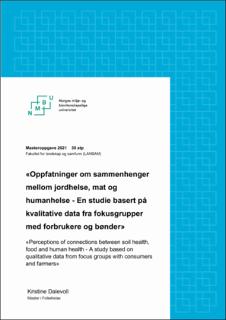| dc.contributor.advisor | Vande Velde, Fiona | |
| dc.contributor.author | Dalevoll, Kristine | |
| dc.date.accessioned | 2021-07-05T13:41:59Z | |
| dc.date.available | 2021-07-05T13:41:59Z | |
| dc.date.issued | 2021 | |
| dc.identifier.uri | https://hdl.handle.net/11250/2763461 | |
| dc.description.abstract | I en håndfull med sunn jord finnes det fler organismer enn mennesker på jord. Når vi spiser, tygger vi maten i små biter før vi sender den videre ned i magen og tarmen vår. Her blir det brutt ned av bakterier før det sendes videre nedover i fordøyelsessystemet. Disse bakteriene er essensielle for vår helse, og de livnæres av maten vi spiser (Tickell & Harrell Tickell, 2020). For å få tilgang til næringsstoffer som fosfor, nitrogen og sulfur er plantene avhengig av jordmikrober. Gjennom disse jordmikrobene blir næringsstoffene brutt ned til mindre former som gjør det mulig for plantene å ta opp. Disse næringsstoffene blir med i inn i kroppen via maten og tas opp i fordøyelsessystemet vårt. Vi er med andre ord avhengig av jordens evne til å opprettholde de metabolske mekanismene som gjør næringsstoffene tilgjengelig for plantene vi spiser (Jacoby, Peukert, Succurro, Koprivova, & Kopriva, 2017). Sammenhengen mellom jordhelse, mat og humanhelse er essensiell for vår eksistens. Allikevel virker det som om flere mennesker forholder seg til natur og matproduksjon på en annen måte enn før. Tidligere litteratur på dette emnet er mangefult. Det finnes mye forskning på de biologiske og fysiske effektene jord har på humanhelse, men svært lite på hvordan forbrukere ser jord og humanhelse i et holistisk perspektiv. Denne masteroppgaven har som mål å utforske forbrukerperspektivet rundt sammenhengene mellom jordhelse, mat og humanhelse. Ved å anvende hybridforum som metode, ble det holdt møter fordelt over 4 dager hvor deltakerne diskuterte problemstillinger relatert til jordhelse og matproduksjon. Funnene viser at deltakernes konseptualisering av helse i et matperspektiv fokuserer på helse som mental helse og fremtidig helse. Mental helse er tolket som aspektene sosial inkludering, velvære og tilhørighet. Fremtidig helse er tolket som en bekymring for fremtidens bærekraftige matproduksjon, samt bevaring av god matjord gjennom et matforsynsingsperspektiv. Menneskets forhold til matens opprinnelse og jorden som dens opphav er endret over tid. Studien fremhever et behov for en felles forståelse for jord, samt et felles språk blant produsenter og forbrukere slik at bærekraftsutfordringene vi står ovenfor vil være løsbare. | en_US |
| dc.description.abstract | In a handful of good soil there are more microorganisms than there are people on Earth. When we consume food, we chew it into smaller pieces before passing it down to our stomach and intestines. Here it is broken down by bacteria before it travels further down in our system where our body absorbs the nutrients it needs. These bacteria are essential for human health, and they live off the food we serve them (Tickell & Harrell Tickell, 2020). In order to get access to nutrients such as phosphorus, nitrogen, and sulphur our plant is dependent on the microbes in the soil. Through these microbes, the nutrients are broken down into smaller structures which makes it possible for the plants to absorb. Through our diet, these nutrients follow the plants into our body where they are absorbed through our digestion system and contributes to a healthy human body. In other words, we are dependent on the soils capacity to uphold the metabolic mechanisms that makes the nutrients available to the plants we eat (Jacoby et al., 2017). The links between soil health, food and human health is essential to our existence. Still, it seems like an increasing number of people relates to nature and food production in a different way than before. Previous literature on the subject is lacking. There is a lot of research on the biological and physical effects of soil on human health, but very little on how consumers see soil and human health in a holistic perspective. This master's thesis aims to explore the consumer perspective on the connection between soil health, food, and human health. Using hybrid forum as a method, this study consisted of four individual hybrid competence group meetings. Here, the participants discussed issues related to soil health and food production through a sharing of experiences and views. The findings show that the participants' conceptualization of health in a food perspective focuses on health as mental health and future health. Mental health is interpreted as the aspects of social inclusion, well-being, and social settings. Future health is interpreted as a concern for the future of sustainable food production, and the preservation of good topsoil in a food supply perspective. Man's relationship to soil and the origin of food has changed over time. This study highlights the need for a common understanding of soil as well as a common language amongst producers and consumers. In this way, humans might contribute so that food production and soil regeneration might exist simultaneously in the future. | en_US |
| dc.language.iso | nob | en_US |
| dc.publisher | Norwegian University of Life Sciences, Ås | en_US |
| dc.rights | Attribution-NonCommercial-NoDerivatives 4.0 Internasjonal | * |
| dc.rights.uri | http://creativecommons.org/licenses/by-nc-nd/4.0/deed.no | * |
| dc.title | «Oppfatninger om sammenhenger mellom jordhelse, mat og humanhelse : en studie basert på kvalitative data fra fokusgrupper med forbrukere og bønder» | en_US |
| dc.title.alternative | «Perceptions of connections between soil health, food and human health : a study based on qualitative data from focus groups with consumers and farmers» | en_US |
| dc.type | Master thesis | en_US |
| dc.description.localcode | M-FOL | en_US |

